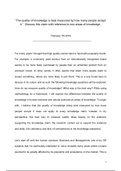“The quality of knowledge is best measured by how many people accept
it.” Discuss this claim with reference to two areas of knowledge.
February 7th 2019
___________________________________________
For many years I thought that high quality comes hand in hand with popularity levels.
For example, a commonly used product from an internationally recognised brand
seems to be more likely purchased by people than an unfamiliar product from an
unknown brand. In other words, it often seems that when more people claim to
accept something, others are more likely to join them. This is a very broad topic to
discuss in its nature and as such the following knowledge questions will be explored:
How do we measure quality of knowledge? What way is the best way? While using
methodology as a framework, I will explore the differences between the quality of
knowledge in human sciences and natural sciences as areas of knowledge. To begin
with, I believe that the quality of knowledge being best measured by how many
people accept it does not apply to every knowledge claim. Instead, in my
perspective, the best way to measure quality relies heavily on the evidence
supporting the knowledge claim, the research carried out to support the evidence
and lastly, the coherency and lack of contradictions in the knowledge presented.
Let’s start off with the human sciences. Business and Management, one of my DP
subjects that I’m particularly interested in, have revealed many cases where a brand
seemed to be greatly affected by its popularity and acceptance on the market. This is
1
, also known as a trend, a particular style in fashion or entertainment that is popular at
a certain point in time. Having said that, it’s important to notice that an increase in
sales does not necessarily symbolise a product of high quality but could instead
indicate a trend, for example.
So, what way - of measuring knowledge - is the best way? The reason behind this
extrapolated question is that I believe that, unlike in the natural sciences where
knowledge can be supported by tests and experiments carried out by scientists or
professors, the quality of knowledge in human sciences tends to be more difficult to
measure. The reason for that is because there are rarely any scientific experiments
or mathematical processes which accurately justifies human behaviour due to
everyone being different and there not being one right answer unlike mathematics.
However, “more difficult” does not mean impossible. Let’s take a look at the
correspondence check for truth. As long as knowledge claims are based on
observations and evidence, then the correspondence check works well. Considering
that market research is mainly based on observations, data and evidence, this truth
check is a valid and appropriate way of providing the business with a concept of
truth. Thus, the reliability and correspondence of the collected data from the market
depends on the quantity and quality of the observations, and the way they have been
used in the overall situation, regardless of the amount of people who have ‘accepted’
the market research.
Recently, in October 2018, a case opened after a serious incident happened to Jim
McCants, 50, when he suddenly needed an urgent liver transplant after a liver failure
2






